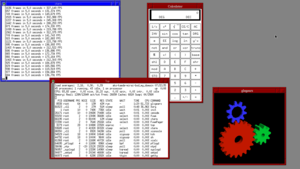 The OpenBSD logo | |
| Release Status | Maintained |
|---|---|
| Release Model | Stable |
| Package Manager | pkg_* |
| Default Desktops | FVWM, AfterStep, Awesome, Blackbox, Enlightenment, Fluxbox, GNOME, IceWM, KDE, Openbox, Window Maker, Xfce |
| Usage Type | Security, Server |
| Architectures | alpha, armish, aviion, hppa, i386, landisk, loongson, luna88k, octeon, powerpc, powerpc64, risc64, sgi, socppc, sparc, sparc64, x86_64, zaurus |
| Website | openbsd.org |
OpenBSD is a Unix operating system, based on the BSD (Berkley Software Distribution), developed by Theo de Raadt since 1995.[1] The first version of OpenBSD (1.2) released on July 1996.[1]

The OpenBSD project produces a free, multi-platform BSD 4.4-based Unix operating system. Its efforts emphasize portability, standardisation, correctness, proactive security and integrated cryptography. The project also develops the widely-used and popular OpenSSH (OpenBSD Secure Shell) software, which provides encrypted communication sessions over a computer network using the SSH protocol.[2]
Many open source projects widely used in other operating systems started off as components of OpenBSD, such as doas, a safer replacement of the popular sudo, the aforementioned OpenSSH and Xenocara, a customized X.Org build infrastructure.[1]
Like all BSD operating systems, OpenBSD provides a kernel, drivers, userland utilities and documentation unlike Linux, which provides just the kernel and drivers, relying on third-parties such as GNU.
